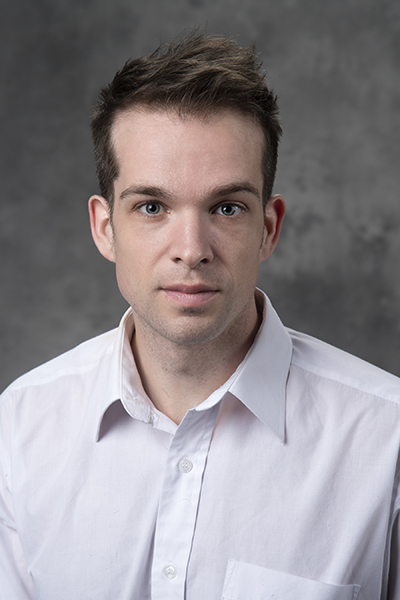September 28, 2022
Monon Bioventures receives nearly $400,000 to develop Purdue-discovered glioblastoma treatment

Funds from a National Cancer Institute grant will be used to demonstrate the feasibility of manufacturing a glioblastoma therapeutic created at the Purdue University College of Pharmacy. Monon Bioventures, which received the grant, will team with Purdue inventor Sandro Matosevic and Genezen on the project. (iStock.com photo)
Monon Bioventures, Genezen and Purdue University pharmacy researcher form partnership to ‘arm’ natural killer cells and prove manufacturability
INDIANAPOLIS and WEST LAFAYETTE, Ind. – Monon Bioventures LLC has received a one-year, $398,314 Phase I Small Business Innovation Research, or SBIR, grant from the National Cancer Institute to demonstrate the feasibility of manufacturing a glioblastoma therapeutic created at the Purdue University College of Pharmacy.
“Glioblastoma is one of the most aggressive cancers of the central nervous system. It grows, multiplies and spreads quickly, is almost always lethal, and there is no effective cure. New, effective therapies are desperately needed,” said Sandro Matosevic, the assistant professor in the Department of Industrial and Physical Pharmacy, who has developed a potential treatment that has been optioned to Monon Bioventures.
Matosevic’s work demonstrates that human immune “natural killer” (NK) cells can be “armed” to specifically attack glioblastomas.
 Sandro Matosevic, assistant professor in the Department of Industrial and Physical Pharmacy, College of Pharmacy, Purdue University (Photo provided by Sandro Matosevic) Download image
Sandro Matosevic, assistant professor in the Department of Industrial and Physical Pharmacy, College of Pharmacy, Purdue University (Photo provided by Sandro Matosevic) Download image
“Therapeutics for certain cancers have used related approaches with other immune cells, called T cells, which are obtained from the patient,” Matosevic said. “Natural killer cells can be accepted from multiple donors, however, not just the patient, which makes them much safer and which dramatically expands our ability to manufacture them in large doses to treat many patients. They are also very efficient at killing glioblastoma cells.”
Joe Trebley, president and CEO of Monon Bioventures, which is housed in the Indiana Center for Biomedical Innovation, said the federal funds for Matosevic’s work have the potential to bring hope to patients suffering from glioblastoma.
“His discovery provides a critical preclinical proof of concept of the disease,” Trebley said. “Our plans are to translate that discovery into the clinic by first working on the manufacturability of the novel therapeutic.”
Monon Bioventures will work on the treatment with Matosevic’s laboratory at Purdue and Genezen, a viral vector and gene therapy contract development and manufacturing organization, or CDMO.
“Arming the NK cells requires genetic modification of the cells through use of an appropriate viral vector as a tool,” Trebley said. “Genezen is a scientific leader in the production of lentiviral vectors and their use in cell transduction, which is delivering genes to cells. We are lucky to have them here with us in Indiana.”
Dave Wilhite, Genezen’s chief business officer, credited Monon Bioventures for its strong track record in translating innovative discoveries into clinical assets.
“Using natural killer cells as a therapy is on the cutting edge of innovation and has shown immense promise,” Wilhite said. “That is Monon Bioventures’ sweet spot, and we are excited to partner with them on this project.”
After the grant-sponsored work is complete, Monon Bioventures will discuss with the U.S. Food and Drug Administration the company’s plan to move the treatment to clinical studies. After receiving the FDA’s feedback, the company will look to finance the project further.
Trebley credited the NCI and its SBIR program for critical support of innovation and discovery in the early development phase of cancer research.
“The grants are highly competitive, yet critical to funding novel potential therapeutics that translate out of academic labs,” he said.
Matosevic disclosed his glioblastoma treatment to the Purdue Research Foundation Office of Technology Commercialization, which has applied for a patent to protect the intellectual property. The Office has granted Monon Bioventures the option to negotiate a license to this intellectual property.
About Monon Bioventures
Monon Bioventures LLC (MBV) is a privately held company created to help world-class investigators navigate the early-stage challenges of translating their research into the clinic. MBV provides assistance to turn their ideas into assets recognized as valuable by follow-on capital providers like angel investors, venture capitalists and strategic corporate partners.
About Genezen
Founded in Indianapolis in 2014, Genezen is focused on supporting the demands of the current and future gene and cell therapy manufacturing market worldwide — making viral vector production accessible to both early-stage, growth-oriented companies and established industry leaders. Genezen offers early-phase process development, GMP lentiviral vector production, retroviral vector production and analytical testing services, building on the company’s expansive knowledge and experience in the industry and working with the nation’s leading institutions. For more information or to learn more about services offered in Genezen’s new cGMP facility, please visit www.genezen.com.
About Purdue University
Purdue University is a top public research institution developing practical solutions to today’s toughest challenges. Ranked in each of the last five years as one of the 10 Most Innovative universities in the United States by U.S. News & World Report, Purdue delivers world-changing research and out-of-this-world discovery. Committed to hands-on and online, real-world learning, Purdue offers a transformative education to all. Committed to affordability and accessibility, Purdue has frozen tuition and most fees at 2012-13 levels, enabling more students than ever to graduate debt-free. See how Purdue never stops in the persistent pursuit of the next giant leap at https://stories.purdue.edu.
About Purdue Research Foundation Office of Technology Commercialization
The Purdue Research Foundation Office of Technology Commercialization operates one of the most comprehensive technology transfer programs among leading research universities in the U.S. Services provided by this office support the economic development initiatives of Purdue University and benefit the university’s academic activities through commercializing, licensing and protecting Purdue intellectual property. The office is housed in the Convergence Center for Innovation and Collaboration in Discovery Park District at Purdue, adjacent to the Purdue campus. In fiscal year 2021, the office reported 159 deals finalized with 236 technologies signed, 394 disclosures received and 187 issued U.S. patents. The office is managed by the Purdue Research Foundation, which received the 2019 Innovation and Economic Prosperity Universities Award for Place from the Association of Public and Land-grant Universities. In 2020, IPWatchdog Institute ranked Purdue third nationally in startup creation and in the top 20 for patents. The Purdue Research Foundation is a private, nonprofit foundation created to advance the mission of Purdue University. Contact otcip@prf.org for more information.
Writer/Media contact: Steve Martin, sgmartin@prf.org
Sources: Sandro Matosevic, sandro@purdue.edu
Joe Trebley, joe@mononbioventures.com
